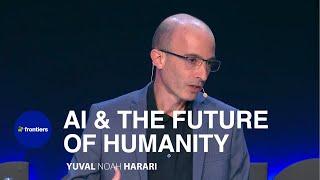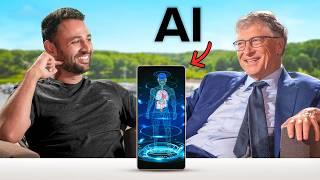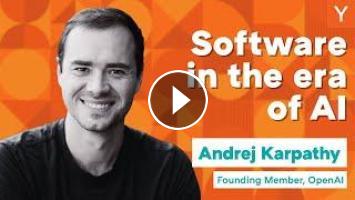Andrej Karpathy's keynote on June 17, 2025 at AI Startup School in San Francisco. Slides provided by Andrej: https://drive.google.com/file/d/1a0h1mkwfmV2PlekxDN8isMrDA5evc4wW/view?usp=sharing
Chapters (Powered by https://ChapterMe.co) -
00:00 - Intro
01:25 - Software evolution: From 1.0 to 3.0
04:40 - Programming in English: Rise of Software 3.0
06:10 - LLMs as utilities, fabs, and operating systems
11:04 - The new LLM OS and historical computing analogies
14:39 - Psychology of LLMs: People spirits and cognitive quirks
18:22 - Designing LLM apps with partial autonomy
23:40 - The importance of human-AI collaboration loops
26:00 - Lessons from Tesla Autopilot & autonomy sliders
27:52 - The Iron Man analogy: Augmentation vs. agents
29:06 - Vibe Coding: Everyone is now a programmer
33:39 - Building for agents: Future-ready digital infrastructure
38:14 - Summary: We’re in the 1960s of LLMs — time to build
Drawing on his work at Stanford, OpenAI, and Tesla, Andrej sees a shift underway. Software is changing, again. We’ve entered the era of “Software 3.0,” where natural language becomes the new programming interface and models do the rest.
He explores what this shift means for developers, users, and the design of software itself— that we're not just using new tools, but building a new kind of computer.
More content from Andrej: https://www.youtube.com/@AndrejKarpathy
Thoughts (From Andrej Karpathy!)
0:49 - Imo fair to say that software is changing quite fundamentally again. LLMs are a new kind of computer, and you program them *in English*. Hence I think they are well deserving of a major version upgrade in terms of software.
6:06 - LLMs have properties of utilities, of fabs, and of operating systems → New LLM OS, fabbed by labs, and distributed like utilities (for now). Many historical analogies apply - imo we are computing circa ~1960s.
14:39 - LLM psychology: LLMs = "people spirits", stochastic simulations of people, where the simulator is an autoregressive Transformer. Since they are trained on human data, they have a kind of emergent psychology, and are simultaneously superhuman in some ways, but also fallible in many others. Given this, how do we productively work with them hand in hand?
Switching gears to opportunities...
18:16 - LLMs are "people spirits" → can build partially autonomous products.
29:05 - LLMs are programmed in English → make software highly accessible! (yes, vibe coding)
33:36 - LLMs are new primary consumer/manipulator of digital information (adding to GUIs/humans and APIs/programs) → Build for agents!
Some of the links:
- Software 2.0 blog post from 2017 https://karpathy.medium.com/software-2-0-a64152b37c35
- How LLMs flip the script on technology diffusion https://karpathy.bearblog.dev/power-to-the-people/
- Vibe coding MenuGen (retrospective) https://karpathy.bearblog.dev/vibe-coding-menugen/
Chapters (Powered by https://ChapterMe.co) -
00:00 - Intro
01:25 - Software evolution: From 1.0 to 3.0
04:40 - Programming in English: Rise of Software 3.0
06:10 - LLMs as utilities, fabs, and operating systems
11:04 - The new LLM OS and historical computing analogies
14:39 - Psychology of LLMs: People spirits and cognitive quirks
18:22 - Designing LLM apps with partial autonomy
23:40 - The importance of human-AI collaboration loops
26:00 - Lessons from Tesla Autopilot & autonomy sliders
27:52 - The Iron Man analogy: Augmentation vs. agents
29:06 - Vibe Coding: Everyone is now a programmer
33:39 - Building for agents: Future-ready digital infrastructure
38:14 - Summary: We’re in the 1960s of LLMs — time to build
Drawing on his work at Stanford, OpenAI, and Tesla, Andrej sees a shift underway. Software is changing, again. We’ve entered the era of “Software 3.0,” where natural language becomes the new programming interface and models do the rest.
He explores what this shift means for developers, users, and the design of software itself— that we're not just using new tools, but building a new kind of computer.
More content from Andrej: https://www.youtube.com/@AndrejKarpathy
Thoughts (From Andrej Karpathy!)
0:49 - Imo fair to say that software is changing quite fundamentally again. LLMs are a new kind of computer, and you program them *in English*. Hence I think they are well deserving of a major version upgrade in terms of software.
6:06 - LLMs have properties of utilities, of fabs, and of operating systems → New LLM OS, fabbed by labs, and distributed like utilities (for now). Many historical analogies apply - imo we are computing circa ~1960s.
14:39 - LLM psychology: LLMs = "people spirits", stochastic simulations of people, where the simulator is an autoregressive Transformer. Since they are trained on human data, they have a kind of emergent psychology, and are simultaneously superhuman in some ways, but also fallible in many others. Given this, how do we productively work with them hand in hand?
Switching gears to opportunities...
18:16 - LLMs are "people spirits" → can build partially autonomous products.
29:05 - LLMs are programmed in English → make software highly accessible! (yes, vibe coding)
33:36 - LLMs are new primary consumer/manipulator of digital information (adding to GUIs/humans and APIs/programs) → Build for agents!
Some of the links:
- Software 2.0 blog post from 2017 https://karpathy.medium.com/software-2-0-a64152b37c35
- How LLMs flip the script on technology diffusion https://karpathy.bearblog.dev/power-to-the-people/
- Vibe coding MenuGen (retrospective) https://karpathy.bearblog.dev/vibe-coding-menugen/
- Category
- Artificial Intelligence
- Tags
- YC, Y Combinator












Comments